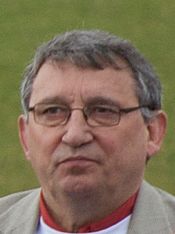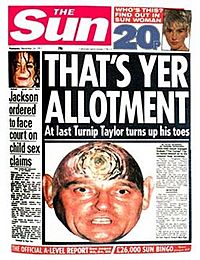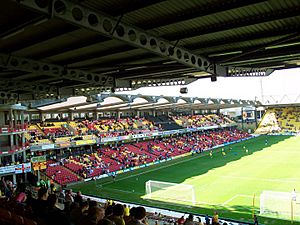Graham Taylor facts for kids

Taylor pictured in 2010
|
|||
| Personal information | |||
|---|---|---|---|
| Full name | Graham Taylor | ||
| Date of birth | 15 September 1944 | ||
| Place of birth | Worksop, England | ||
| Date of death | 12 January 2017 (aged 72) | ||
| Place of death | Kings Langley, England | ||
| Position(s) | Full back | ||
| Senior career* | |||
| Years | Team | Apps | (Gls) |
| 1962–1968 | Grimsby Town | 189 | (2) |
| 1968–1972 | Lincoln City | 150 | (1) |
| Total | 339 | (3) | |
| Managerial career | |||
| 1972–1977 | Lincoln City | ||
| 1977–1987 | Watford | ||
| 1987–1990 | Aston Villa | ||
| 1990–1993 | England | ||
| 1994–1995 | Wolverhampton Wanderers | ||
| 1996 | Watford | ||
| 1997–2001 | Watford | ||
| 2002–2003 | Aston Villa | ||
| *Club domestic league appearances and goals | |||
Graham Taylor OBE (born 15 September 1944 – died 12 January 2017) was a famous English football player and manager. He also worked as a TV expert and was the chairman of Watford Football Club. He is best known for managing the England national football team from 1990 to 1993. He also managed several club teams like Lincoln City, Watford, Aston Villa, and Wolverhampton Wanderers.
Graham Taylor was born in Worksop, Nottinghamshire. He grew up in Scunthorpe, Lincolnshire, which he considered his hometown. His father was a sports journalist. Graham loved football from a young age, watching Scunthorpe United play. He became a professional player, playing as a full back for Grimsby Town and Lincoln City.
After an injury forced him to stop playing in 1972, Taylor became a manager. He helped Lincoln City win the Fourth Division title in 1976. Then, he moved to Watford in 1977. He achieved amazing success there, taking Watford from the Fourth Division all the way to the top division (First Division) in just five years! Under his leadership, Watford finished second in the First Division in 1982–83 and reached the 1984 FA Cup Final in 1984.
Taylor then managed Aston Villa from 1987. He helped them get promoted in 1988 and finish second in the First Division in 1989–90. In July 1990, he became the manager of the England national team. England qualified for the 1992 European Championship but were knocked out early. Taylor resigned in November 1993 after the team failed to qualify for the 1994 FIFA World Cup. He faced a lot of criticism during this time, especially after a TV documentary called An Impossible Job showed behind-the-scenes footage of the team's struggles.
After his time with England, Taylor returned to club management. He managed Wolverhampton Wanderers and then had a second successful period at Watford. He led Watford to the Premier League in 1999 with two promotions in a row. His last managing job was with Aston Villa, where he returned in 2002. He retired from managing at the end of the 2002–03 season. Graham Taylor also served as Watford's chairman from 2009 to 2012 and was an honorary life-president. He also worked as a football expert for BBC Radio Five Live.
Early Life and School
Graham Taylor was born in Worksop, Nottinghamshire. In 1947, his family moved to Scunthorpe. His father, Tom, was a sports reporter for the Scunthorpe Evening Telegraph. Graham went to Henderson Avenue Junior School and then Scunthorpe Grammar School. There, he met his future wife, Rita.
He was a talented football player and played for the England Grammar Schools team. After passing six O-levels in 1961, he joined the sixth form. However, he left school after a year to become a professional footballer. His head teacher was not happy, telling him: "Grammar school boys don't become footballers."
Playing Career Highlights
Graham Taylor started his football journey as a young player for Scunthorpe United. In 1962, he joined Grimsby Town. He played his first game for them in September 1963, a 2–1 win against Newcastle United. He played 189 games as a full-back for Grimsby Town, scoring two goals.
In 1968, he moved to Lincoln City for £4,000. He played 150 games for Lincoln, scoring one goal. Sadly, a serious hip injury forced him to retire from playing in 1972.
Club Managerial Career
Managerial Achievements
Graham Taylor holds a special record: he was the only manager to lead two teams to score over 70 points in a single Football League season. This was under the old scoring system where a win was worth two points and a draw one point. This system was used for over 90 years until 1981. He achieved this with Lincoln City (74 points in 1976) and Watford (71 points in 1978).
Lincoln City (1972–1977)
At 27, Taylor became the youngest person to become an FA coach. After stopping his playing career, he became the manager of Lincoln City on 7 December 1972, at just 28 years old. In his first season, Lincoln finished 10th.
Taylor led Lincoln to win the Fourth Division title in 1976. His team set league records with 32 wins, only 4 defeats, and 74 points (under the two-points-for-a-win system). Lincoln finished 9th in the Third Division in his last season, 1976–1977.
Watford (1977–1987)
In June 1977, the famous musician Elton John, who owned Watford, hired Graham Taylor as manager. Taylor surprised many by choosing Watford, a Fourth Division club, over a top-division team like West Bromwich Albion. Elton John had been advised by legendary manager Don Revie to hire Taylor.
Taylor achieved incredible success at Watford, taking them from the Fourth Division to the First Division in just five years. In his first season, Watford won the 1977–78 Fourth Division title, losing only five games and winning by 11 points. The next season, they finished second in the Third Division, earning another promotion.
After a tougher season in the Second Division, Watford improved greatly. In the 1981–82 season, they finished second and were promoted to the First Division. In their first season in the top division, 1982–83, Watford finished as runners-up in the entire Football League. This was their highest-ever league finish. They also had big wins, like 8–0 against Sunderland.
Taylor also led Watford to the 1984 FA Cup Final, but they lost 2–0 to Everton. In his final season, 1986–87, Watford finished ninth in the league and reached the FA Cup semi-finals.
Aston Villa (1987–1990)
In May 1987, Taylor left Watford for Aston Villa. Villa had just been relegated from the First Division, which was a big setback for a club that had won the European Cup five years earlier.
Taylor quickly brought Aston Villa back to the top division in his first try. In his third season, Villa finished as runners-up in the First Division. After this success, Taylor accepted the offer to manage the England national football team.
International Management: England (1990–1993)
Becoming England Manager
When Graham Taylor became England manager, some critics pointed out that he had never won a major trophy. They also noted he hadn't played at the highest level of football. This led to some doubts about whether he could earn the respect of top players.
Euro 1992 Campaign
England had a good start under Taylor, losing only one of his first 23 matches. However, they struggled to qualify for Euro '92. They drew twice with Ireland and only narrowly beat Turkey. A late goal from Gary Lineker against Poland secured their spot in the tournament.
At Euro 92, England was in a group with France, Denmark, and hosts Sweden. England drew 0–0 with Denmark and 0–0 with France. To reach the semi-finals, England needed to beat Sweden. David Platt scored early, but England missed chances to extend their lead. Sweden then scored twice in the second half to win 2–1, knocking England out.
During the game, Taylor substituted Gary Lineker, who was playing his last game for England. This decision was very unpopular, as it stopped Lineker from possibly breaking Bobby Charlton's goal-scoring record. The media strongly criticized Taylor. The Sun newspaper famously published a picture of Taylor's face on a turnip with the headline: "Swedes 2 Turnips 1."
1994 World Cup Qualification

After Euro 92, Taylor tried to improve his relationship with the press. However, it didn't last long. England's first game after the Euros was a 1–0 friendly defeat to Spain, which led The Sun to call Taylor a "Spanish onion."
England was in a tough group for the 1994 FIFA World Cup qualification, with Norway, the Netherlands, Poland, Turkey, and San Marino. England was expected to qualify alongside the Netherlands. They started with a disappointing 1–1 draw against Norway.
The campaign seemed to get back on track with big wins against Turkey (4–0 and 2–0) and a 6–0 home victory over San Marino. During the San Marino game, Taylor famously confronted a fan who was racially abusing John Barnes.
In April 1993, England played the Netherlands at Wembley Stadium. England went 2–0 up, but the Netherlands scored to make it 2–1. Four minutes from the end, the Netherlands scored a penalty, and the game ended 2–2. This result put England's World Cup hopes in danger.
England then drew 1–1 with Poland and lost 2–0 to Norway. These results made it very difficult to qualify. The press continued to criticize Taylor heavily, with headlines like "NORSE MANURE."
England's World Cup hopes were almost gone. They played a friendly tournament in the US, losing 2–0 to the United States, which The Sun called "YANKS 2 PLANKS 0!".
The crucial match was against the Netherlands in Rotterdam. England played well but lost 2–0. There were controversial referee decisions, including a foul on David Platt that should have resulted in a red card for the Dutch player, and a retaken free kick that led to a Dutch goal. Taylor was very angry on the sidelines.
England still had a very small chance to qualify if they won by a huge margin against San Marino and the Netherlands lost to Poland. England won 7–1 against San Marino, but San Marino scored after just 8.3 seconds, the fastest-ever World Cup goal. Even with the big win, England failed to qualify for the World Cup.
Taylor resigned on 23 November 1993, six days after England's failure to qualify. He said he was "sad" and that it was his intention to resign if they didn't qualify. During the qualifying campaign, Taylor had allowed a TV documentary called An Impossible Job to film behind the scenes. In the film, Taylor was heard using strong language and saying his famous phrase: "Do I not like that," just before England conceded a goal to Poland.
Return to Club Management
Wolverhampton Wanderers (1994–1995)
In March 1994, Sir Jack Hayward appointed Taylor as manager of Wolverhampton Wanderers. Many people in English football were still unhappy with Taylor after his time as England manager.
In his first full season, Taylor led Wolves to fourth place in Division One, which meant they qualified for the play-offs. They lost to Bolton Wanderers in the play-offs. They also reached the quarter-finals of the FA Cup.
Taylor spent a lot of money on new players at Wolves. However, after a poor start to the next season, he resigned on 13 November 1995 due to pressure from supporters. Taylor later said his departure from Wolves was his "lowest point" in football, even more so than leaving England, because he felt he had "lost his standing" in the game.
Return to Watford (1996–2001)
In February 1996, Elton John bought Watford again and appointed Taylor as General Manager. A year later, Taylor became the club's manager once more. He said the General Manager role had "bored me stiff." He quickly led Watford to win the Division Two championship in 1998.
The next season, Watford won the Division One Play-off Final by beating Bolton Wanderers 2–0 at Wembley. This meant they were promoted to the Premier League. Taylor missed two months of this season in 1998 due to a serious health issue that almost took his life.
Watford was relegated from the Premiership after one season. Taylor decided to retire after the following season, where Watford finished 9th in Division One. During this final season, Taylor became only the third manager to manage 1,000 league games in England.
Return to Aston Villa (2002–2003)
Taylor came out of retirement in February 2002 to return to Aston Villa. However, he retired for a second time after Villa finished 16th in the Premiership in the 2002–03 season. He mentioned difficulties in his relationship with the club's chairman, Doug Ellis.
Later Life and Legacy

In 2003, Taylor became vice-president at Scunthorpe United, his hometown club. He also worked as a football expert for BBC Radio Five Live from 2004.
His time at Scunthorpe saw the club improve greatly. They avoided relegation in his first season on the board. The next season, they were promoted to League One. Two years later, they were promoted to the Championship as League One champions.
Taylor returned to Watford on 23 January 2009 as a director and became interim chairman in December 2009. He resigned as chairman on 30 May 2012 but remained the honorary life president of the club until his death.
In 2014, Watford renamed one of their stands at Vicarage Road the Graham Taylor Stand to celebrate his amazing achievements with the club.
Other Work
Graham Taylor supported several charities. He was a patron for Sense-National Deafblind and Rubella Association and DebRa. He was also a Celebrity Ambassador for Sense Enterprise Board in Birmingham, helping to raise money and awareness. He even ran the London Marathon in 2004. He also supported the Royal British Legion and cycled from London to Paris in 2010 to raise funds for their Poppy appeal.
Personal Life and Death
Graham Taylor met his wife, Rita Cowling, when he was thirteen. They married in 1965 and had two daughters.
Graham Taylor sadly passed away from a heart attack on the morning of 12 January 2017. His funeral was held on 1 February at St Mary's Church, Watford, with many famous football figures attending to pay their respects.
Honours
As a Manager
Lincoln City
- Football League Fourth Division: 1975–76
Watford
- Football League Division One play-offs: 1998–99
- Football League Division Two: 1997–98
- Football League Fourth Division: 1977–78
- FA Cup runner-up: 1983–84
Managerial Statistics
| Team | From | To | Record | ||||
|---|---|---|---|---|---|---|---|
| G | W | D | L | Win % | |||
| Lincoln City | Dec 1972 | Jun 1977 | 236 | 104 | 69 | 63 | 44.07 |
| Watford | Jun 1977 | May 1987 | 527 | 244 | 124 | 159 | 46.30 |
| Aston Villa | May 1987 | Jul 1990 | 142 | 65 | 35 | 42 | 45.77 |
| England | Jul 1990 | Nov 1993 | 38 | 18 | 13 | 7 | 47.37 |
| Wolverhampton Wanderers | Mar 1994 | Nov 1995 | 88 | 37 | 27 | 24 | 42.05 |
| Watford | Feb 1996 | Jun 1996 | 18 | 5 | 8 | 5 | 27.78 |
| Watford | Jun 1997 | May 2001 | 202 | 79 | 52 | 71 | 39.11 |
| Aston Villa | Feb 2002 | May 2003 | 60 | 19 | 14 | 27 | 31.67 |
| Total | 1,311 | 571 | 342 | 398 | 43.55 | ||
See also
 In Spanish: Graham Taylor para niños
In Spanish: Graham Taylor para niños
 | Chris Smalls |
 | Fred Hampton |
 | Ralph Abernathy |

